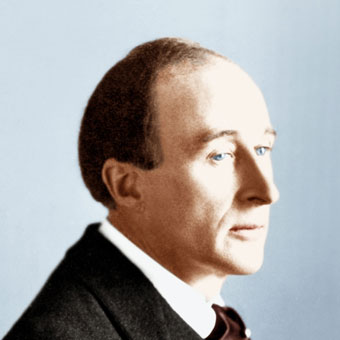
Frederick Delius
d. 10 June 1934, Grez-sur-Loing
Frederick Delius was born on 29 January 1862 in Bradford, Yorkshire, the son of German-born parents who had emigrated to England to participate in the wool-trade, then one of Britain’s most successful export industries. His father, Julius, was a keen musician; Friedrich, as he had been christened, grew in a musical household and comfortable circumstances. Although he was a proficient pianist and violinist even before entering his teens, Delius was expected to take up the family business; he worked there for over 3 years as an apprentice, with a growing sense of frustration.
In 1884 Delius obtained his father’s permission to run his orange plantation in Florida, at Solana Grove, where he soon installed a piano and took theory lessons from a local teacher; he also learned a good deal from the singing of his black workers. In 1885, after a year and a half he settled in Danville, Virginia, now competent enough to teach music. He enrolled as a student at the New York Conservatorium from 1886-88, before returning to Europe and settling in Paris, where he stayed for ten years.
His compositional activities now began in earnest. He had written the orchestral Florida Suite, his first major score, in 1886-87, and it wasn’t long before a flow of works, some of them on a large scale, began to emerge from his pen: the operas Irmelin (1890–92), The Magic Fountain (1894-95) and Koanga (1895-97), orchestral works such as Paa Vidderne (1890-92), Over the hills and far away (1895–97), Appalachia (1896, rev. 1902-3) and many others. The fact that he had little occasion to hear his music did not deter him.
Although Evard Grieg was an early friend and supporter (and influence), Delius’ social circle was more often populated with painters rather than musicians, and his friends included Edvard Munch, Paul Gauguin, Christian Krohg and others. The central relationship of his life was also with a painter, the German-born Helena (‘Jelka’) Rosen, whom he met in 1896 and married in 1903; in 1897 he moved into her house at Grez-sur-Loing, south of Paris, and here he lived for the rest of his life.
Over the next quarter-century Delius produced one major work after another: the tone-poem Paris (1899), perhaps his single most important score for orchestra alone; the opera A Village Romeo and Juliet (1899–1901); the ambitious Mass of Life for chorus and orchestra (1904-5), to texts by Nietzsche; and the ‘English Rhapsody’ Brigg Fair (1907), based on a melody collected by his friend Percy Grainger. It seemed that nothing could stop the stream of music. But some time between 1896 and 1900 Delius had contracted syphilis and during the First World War his health began to fail: he began to lose the use of his limbs, and his eyesight grew steadily worse; by the mid-1920s composition was beyond him.
Then, in the summer of 1928, he received a letter from a young English musician by the name of Eric Fenby; Fenby was so moved to discover that Delius could no longer compose that he offered his services as amanuensis. The following year, with Fenby’s help, the music again began to emerge as Delius enjoyed a last, unexpected, Indian summer, before his death on 10 June 1934.
Frederick Delius is published by Boosey & Hawkes.
This biography can be reproduced free of charge in concert programmes with the following credit: Reprinted by kind permission of Boosey & Hawkes
